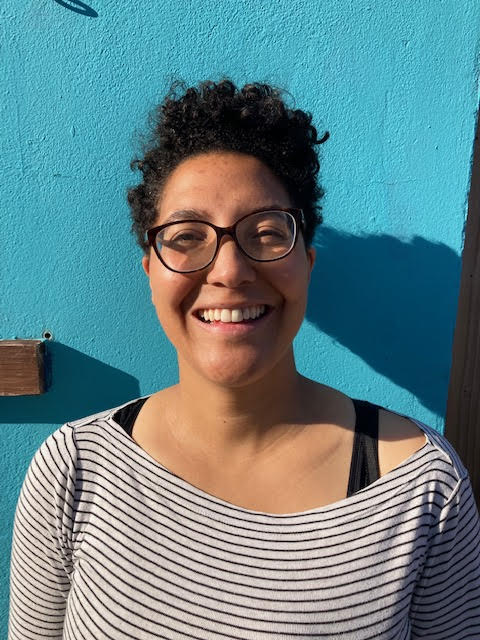
Tunde James is a Creative Facilitator and theatre practitioner who has been a staff member at LIFEbeat programs for more than 10 years. Tunde is a child counselor, studying towards becoming an arts therapist. She specialises in theatre and drama.
Here, Tunde tells us why she keeps coming back to LIFEbeat and why she thinks it’s so important to use the arts in her work with young people.
How did you first become part of LIFEbeat?
I was introduced to LIFEbeat through a friend. She had been at a very early LIFEbeat camp and she came away feeling really inspired. She told me that she thought I would really love it and I should get involved. After that I went along to a LIFEbeat evening event and met some more of the facilitators. They all seemed like really brilliant, motivated people and their passion and dedication really grabbed me. I was intrigued, and as I had already been working with young people for around 10 years at that time, I wanted to get involved. I had come to a point in my career where I knew I wanted to keep working with young people, but I had hit a bit of a brick wall in terms of how I wanted to engage and what I was going to offer.
I signed up to do an 8 day residential camp. It was really full-on, overwhelming and just absolutely amazing. I realised that I wanted to work with the arts when I worked with young people. I was particularly inspired by the theatre games evening. It comes quite early in the week and I was really inspired by the change that came over the camp during that session. Suddenly, all of these people who had been strangers just 48 hours before were giggling and laughing together and getting up in front of each other to take a creative risk and perform. It was amazing to see that happening in such a short space of time.
On that same camp, there had been some reported murmurings of homophobic comments. Some young people were using the term ‘gay’ as a put-down. One day, one of the male facilitators stood up in the community meeting and said that he was a gay man and that from his experience he knew that when you are a young person and you hear people using those terms and making jokes about homosexuality, it can have a really long-lasting effect on your sense of self. I remember him saying that we all had an opportunity to be more accepting and to support everyone in the community to feel comfortable to be themselves. It struck me as such a brave and humane way to approach it. He didn’t make anybody feel bad but just invited them to think about the impact they were having. It was a powerful moment, and later in the week there was a young person who decided to step out and talk about his own sexuality because he felt accepted and seen by the community. Watching that process had a really big effect on me. I loved the fact that nobody was scolded or told they were doing the wrong thing. I realized there were really good options for approaching these topics that felt completely inclusive and invitational.
How have you been involved with LIFEbeat since your first program?
I’ve done several camps over the years. Sometimes two a year. I’ve been involved with the Youth Council, Youth Leadership Programs and I’m now preparing to lead Creative Practice trainings. I’ve enjoyed doing Youth Leadership Programmes and the Youth Council in particular because it’s great to be able to support young people a little bit more during the year. It’s really special to be a part of a camps program and to see how young people and staff grow and blossom during the week, but it’s also really great to get to know them outside of the camp and to check in with them more regularly. It’s nice to be able to connect in a more regular way.
What does LIFEbeat mean to you?
I think there’s something about being really heart-centered at LIFEbeat. We really start with a foundation which is about wanting the best for the young people we meet. There is a shared sense of purpose and wanting to create a positive community that includes every person and that allows them to develop in their own unique way. I’ve heard it described as ‘love-bombing’ and I like that.
I’ve worked in schools for many years and I have also worked in youth work settings. They are big systems and as a consequence they have constraints. There is something about the smaller, community feel of a LIFEbeat program that makes it easier to keep coming back to the real reason you wanted to work with young people in the first place. I think that if you’re a teacher and you work in a school or institution, you probably get into that line of work because you want to support young people to grow in healthy ways and to be part of creating a positive world for them to grow up in, but there are just so many day to day factors that get in the way of that when you are in a large institution.
LIFEbeat is really committed to making programs feel fun for everyone who is involved. That’s just so important. We’re not really doing our job if people aren’t having a lot of fun and really expressing their true self. I can’t say that about every situation that I work in with young people.
What other work do you do outside of LIFEbeat?
Working with LIFEbeat has had quite a big impact on the other things that I have decided to do in my career. At one point, after my second camp, I remember thinking that I wanted to make the rest of my life more like LIFEbeat and how I feel when I am working with LIFEbeat. At that point I consciously decided to more work with the arts and I am now training towards becoming an arts therapist. This year I qualified as a Child and Adolescent Counsellor, using the arts, and I also work as a Creative Facilitator for a few different organisations, including Kazzum, where I work with young people who are in alternative education provisions. I deliver arts and drama sessions for them.
As I have been studying arts therapy, I’ve been really inspired by the things I am learning and have really appreciated underpinning my work with the therapeutic training and understanding of how trauma works. I’ve been learning more about how to create an environment which is trauma aware so that it feels like a comfortable space for people and the wide range of experiences they might have had. You never know what people are going through. That is something that gets brought home to me every time I attend LIFEbeat programs. To be able to facilitate or teach young people in a way that is hopefully nurturing for everyone is something that really interests me. I want to do more work with helping to create trauma informed approaches for schools so that schools can become places that are welcoming and nurturing for all young people, not just those who are already quite resilient. Some people go into school already prepared to learn, but many young people find that the school environment just doesn’t work for them, and there are so many ways that we can change that.
What books or further reading would you recommend?
I have got some books on my shelf that I always come back to. Working with groups I often come back to Catch the Fire by Charlie Murphy and Peggy Taylor. For theatre games there is a book called Impro by Keith Johnson which I really like. It talks about his journey into finding his way of doing things and questioning all the influences that he started out with. Books I’ve found inspiring about working therapeutically include
On becoming a person by Carl Rogers, The Body Keeps the Score by Bessell Van de Kolk and No drama Discipline by Daniel Seigel and Tina Payne Bryson
What advice would you have for yourself when you were just starting out as a facilitator?
I would say do what you like most, enjoy and care about. Everybody has their own thing that they love most and everybody has also got their thing that they think is the most important aspect of a process. You could almost get into arguments about what is actually the most important, but sometimes you just have to pay attention to that thing that you really see the importance of, and let other people take care of that thing they really see the importance of.
It can be really easy to look at what everyone else is doing and think they are all amazing and you are not doing enough or not doing it right. I felt like that reading the other facilitator interviews! But it isn’t true. There is that phrase that is often attributed to Oscar Wilde, that was put into a great song at camp: ‘be yourself, everyone else is taken’. That is a really good one to remember when you are a facilitator. It’s easy to forget that we each have our unique gifts to bring.
Something I realized about facilitating was that I was getting quite nervous about getting up and doing something like theatre games in front of the whole room. What helps me is to focus on the fact that all I need to do is to put across what I love about an activity so that other people can enjoy it too. I am just trying to help people to enjoy themselves and share an experience with each other and that is not about me or doing it right or wrong or looking weird. It’s about the content and the process.
